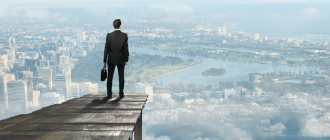Causes of fear of flying on an airplane
Each time, about 70% of those on board experience fear of flying of varying severity. Each passenger has their own reasons for concern.
Before diagnosing yourself with any fear, it is important to understand whether this is really a manifestation of a phobia or just anxiety caused by suspiciousness or a natural reaction of the body. A phobia is practically uncontrollable without the involvement of third-party means: other people, psychologists, medications. Fear can be completely controlled by the power of thought.
- Claustrophobia is the fear of closed spaces. Most note concerns associated with the small cabin of the airliner: low ceilings, narrow aisles, small distances between rows of seats. Even a huge Airbus may seem like a tiny box to those who know first-hand about claustrophobia.
- Acrophobia is a fear of heights and the sky. Persons familiar with the manifestations of this phobia are disturbed by a new environment for the body - air. The lack of solid soil under your feet, the awareness of a distance of 10 thousand meters above the ground, and especially the rise and fall of the airliner, when the window is full of lights of the runway, drives you into horror.
- Aerophobia is the name given to the fear of airplanes, flying and everything connected with them. Some people cannot understand the principle of moving an airplane through the air; others think that there won’t be enough oxygen there and you could suffocate. Sometimes even the size of the aircraft is intimidating.
- Distichiphobia - fear of disasters. Individuals with this phobia cannot calmly move not only by air: any transport causes anxiety and stress. Disasters and accidents happen everywhere. But when flying, everything is more complicated than in other situations: there are usually no survivors in plane crashes. Realizing this at an altitude of 10 km in an airplane seat makes the heart beat faster and the brain panic.
- The fear of losing control over the situation especially often accompanies avid motorists, machinists, and even sometimes the pilots themselves when they are among passengers. The inability to influence the situation can worry, in general, anyone who is used to leading and precisely controlling everything around them.
- Ochlophobia is often observed in those who do not like crowds. Actually, this is the fear of large crowds of people, unfamiliar company. The larger the liner, the more passengers it can accommodate. For those who are afraid of flying, it seems that this whole structure is too noisy, too heavy, unreliable, and other fears are added to ochophobia.
Most often, a phobia does not come alone. The more reasons to worry, the stronger the feelings, and the more difficult it is to cope with them alone. Features of the nervous system, and not just character and willpower, affect the ability to control oneself.
Reasons for fear of flying
Why are people so afraid of flying on an airplane that sometimes they can’t even overcome their fear? There are several reasons for this situation:
- Modern man received the fear of being above the ground from his ancestors along with other genetic information. At one time, people were very frightened by the “iron birds”, so many people flinch when they hear the sound of an airplane.
- When an airliner takes off, the body realizes that it is outside its usual environment. Passengers prone to panic and phobias are faced with a feeling of fear.
- Some people are frightened by previously watched films or read books about plane crashes, or materials about crashes in the media.
- Fear often arises during the first flight; this is where the fear of the unknown comes into play. Sometimes such an experiment turns out to be unsuccessful, or the body mistakes ordinary motion sickness for danger and gives a corresponding signal to the brain.
Often everything is explained by a reluctance to trust your life to strangers - pilots, as well as distrust of a large number of instruments and devices unknown to man. Aerophobia can be a consequence of a long-term depressive state, severe stress or psycho-emotional shock that is not related to flying at all.
Important! Scientists have identified a genetic predisposition to such a phobia. If someone in the family suffers from such disorders, this tendency can be inherited.
Impressionable people who focus their attention on previous negative events for a long time are more susceptible to fear.
Main symptoms
The most common symptoms that people with fear of flying notice in themselves:
- The heartbeat quickens at the mere thought of the upcoming journey by air. Some people’s hearts skip a beat, even if the flight is only in a month;
- the desire to use the usual sedative, alcohol, smoke a cigarette, or use other attempts to calm down;
- dizziness accompanying tachycardia. Particularly impressionable people may even faint;
- due to the fear of flying, sweating increases: wet palms and armpits are faithful companions of those who are familiar with aerophobia;
- the body is in constant tension: endless audio (and if the window allows, then visual) control of the engine, convulsive reactions to any shaking, inability to sleep or simply switch attention;
- suspicion towards the crew: attempts to hear alcohol intoxication in the pilot’s voice, to read the terrible thoughts of the flight attendant, which she allegedly hides behind a smile;
- the turbulence zone, when the liner begins to shake, causes uncontrollable manifestations of phobia and the most terrible thoughts of death.
Information for hypertensive patients
The question of whether you can fly on an airplane if you have hypertension is best asked by your doctor. Depending on the health status of the patient, he may either prohibit or allow air travel.
According to most doctors, it is not recommended for hypertensive patients to fly on an airplane. During the flight, atmospheric pressure decreases, and the amount of oxygen on board decreases. This contributes to an increase in blood pressure. Sometimes, while traveling by plane, a hypertensive crisis or heart attack occurs.
How to overcome the fear of flying on your own?
In fact, the fear of flying for most passengers is not a consequence of their own bad experiences. Most flights end safely, but those who experience aerophobia will feel restless and anxious again the next time they fly. Flying on an airplane for the first time and subsequent times is equally strange, because... The fear of flying begins in the head, and not after a failure in flight. Any fears can be overcome.
What to do before the flight?
It is worth approaching getting rid of phobias responsibly. If anxiety increases from thoughts about the upcoming flight, you need to:
- convince yourself that experiences are meaningless: they will not affect the flight, the pilot, the engines or the environment;
- remind yourself that thoughts are material, and you need to try to either think well about the upcoming flight or not at all;
- review aircraft safety data if your fear of flying is associated with the possibility of a crash, a terrorist attack, or birds flying into a turbine. Ask yourself: what exactly is bothering you? How airport employees protect the airliner from the threat of a terrorist attack, what methods are used to scare away birds, how the plane works, in a word, any information that sheds light on the unknown will help cope with anxiety;
- talk about your fears: to yourself, to a psychologist, to a friend or relative;
- do not look for information about plane crashes, do not watch or listen to the news. Information about the crash a couple of days before the flight will not be associated with you in any way. It will only increase anxiety;
- If you went to the doctor about anxiety, and he prescribed you sedatives, take the course shortly before the flight. Some sedatives have a cumulative effect: one pill won’t do any good, but a two-week course will certainly save you from wasting your nerves.
What to do during the flight?
To overcome your fear of flying on an airplane, you can:
- keep yourself busy. Take care of this in advance: favorite music, book, handicrafts and anything else depending on the possibilities during the flight. Switching thoughts is the best way to completely forget that you are on a plane;
- try reading af. You can come up with your own affirmation, as long as it really calms you down;
- breathing exercises enhance the effect of affirmations: inhale - hold your breath for 5 seconds - exhale - hold your breath for 4 seconds;
- Don't sit by the window. If you got a ticket near the window, try to change. Usually there are no problems with this; there are no fewer people who want to look out the window than those who are afraid;
- drink more water;
- sleep is one of the best ways to pass the time on the road and keep your nerves intact. Unfortunately, most aerophobes cannot sleep during a flight, even if they are very tired.
What to do with your time?
Best option:
- read a book. If you don’t have a book, literature in the pocket of the seat in front of you or a newspaper from the set that the flight attendant will definitely offer will do;
- gadgets in flight are the best friends of aerophobes. They cannot be used only during takeoff and landing. During the flight you can: read, listen to audiobooks, favorite music, movies on headphones. Play office games that take up all your attention. The main thing is to charge the device in advance;
- If flight conditions allow (it’s light on the plane or the lights are on), do some handicrafts. A favorite option for those who are patient and diligent, for whom fine motor skills calm rather than irritate;
- talk to the passenger next to you. Perhaps this is a very interesting person, and several hours of flight will seem like a couple of minutes;
- Confess to the flight attendant “I’m afraid to fly on an airplane.” Perhaps she will tell you what to do.
During turbulence
The plane tries to avoid air pockets as much as possible. If zones of rarefied air cannot be avoided, the liner shakes. Sometimes it happens, to the point of things falling off the shelves. These moments cause panic even among particularly resilient passengers.
To overcome the fear of turbulence during an airplane flight and survive it without nervous loss, you need to:
- listen to the flight attendant's instructions;
- do breathing exercises;
- read an affirmation about a safe flight;
- do not stand behind falling things until the display or flight attendant allows you to unfasten your seat belt;
Don't forget: the plane is designed to overcome turbulence zones. He is strong, the pilot knows what to do. Think about this constantly.
Medicines
Unfortunately, there is no effective and quick pill to help with the fear of flying on an airplane. You should not rely on medication, although taking mild sedatives on the eve of the flight may reduce anxiety. Consult a doctor: therapist, psychotherapist, neurologist.
We study aircraft design and the laws of physics
An effective method to reduce phobias to a minimum is to delve deeper into your knowledge of the subject. Answer all your questions:
- how the flight will take place;
- how the plane works, how it floats in the air;
- who ensures flight safety;
- what skills are required for pilots and flight attendants;
- why is it excluded that the pilot will be drunk;
- what is turbulence;
- how not to panic and not be afraid to fly on airplanes;
- how an airplane is protected from birds, lightning, and icing;
- and other points.
Causes of aerophobia
Before you overcome your fear of flying on an airplane, you should find out what contributes to its appearance. Usually, the development of aerophobia occurs in the same way for everyone. A person getting ready to go on a trip or a business trip experiences severe anxiety. He is visited by thoughts that the plane may fall and he will die. A few days before the appointed date, the stomach shrinks, nausea and vomiting occur more and more often. Already at the airport, sweating increases, hands become cold. After passing through the terminal and boarding the plane, the heartbeat quickens, it becomes difficult to breathe, and dizziness occurs. A person realizes with fear that he will have to travel by air. Sometimes it comes to the point that the passenger gets off the flight.
The main reasons for the development of aerophobia include:
- Development of fear against the background of other mental disorders. Mainly due to stress and depression. Impressionable and sensitive individuals are more likely to be afraid of flying. Fear of flying is common to people who are afraid of heights and confined spaces.
- Genetics also influences the occurrence of a phobia. It manifests itself in an individual whose relatives have anxiety-phobic disorders.
- Living conditions. The environment where a person grew up and the formation of character or personality in childhood play a huge role in the development of phobias.
- Social factors. In most cases, the emergence of aerophobia is influenced by the media, which focus attention on the crash of the airliner and the number of victims. Plus films with scenes of a plane crash.
Professional help
If you can’t stop worrying and being afraid of flying on airplanes on your own, seek help from a specialist. High-quality help will help minimize the manifestations of fears. The main thing is to do this in advance, since the work to eliminate aerophobia can take a long time.
Which doctor should I contact?
The question of how to overcome a strong fear of flying on an airplane is dealt with by a psychologist and psychotherapist.
Advice from psychologists
Psychologists know how to get rid of aerophobia. There is a special algorithm, after going through which the client will be able to forget about the fear of flying or at least learn to control it.
- It’s better to get rid of the problem long before the flight. A week's therapy may not be enough;
- If after the first flight you realize that you are afraid, you should not wait for the second and third to be convinced of this. The sooner you get advice from a psychologist, the easier it will be to solve the problem;
- get ready for serious work with various tasks. The psychologist will ask you to open up, identify problems, and perhaps use technical means: flight simulators, computer or role-playing games related to airplanes.
Pilots' recommendations
Tips from pilots on overcoming the fear of flying on airplanes - a gold mine of knowledge from the most experienced in the matter of air travel:
- turbulence, even very strong, is not dangerous. Modern aircraft are equipped with a special piloting mode during air changes;
- lightning that strikes the plane will linger in the aluminum casing without damaging either the plane or passengers;
- a collision with a bird is almost impossible: in the area of the runway they are driven away by special devices, and at an altitude of 10 thousand meters birds do not fly;
- There are no particularly dangerous places on an airplane: they are all equally safe;
- all aircraft engines can fail only if the fuel runs out. But even this possibility is practically excluded: there is a fuel supply on each board;
- depressurization of the interior is also extremely unlikely;
- and it is certainly impossible to open the door or knock out the window during the flight;
- any suspicion of bad weather or the possibility of heavy icing of the runway or the airliner will lead to cancellation of the flight. The flight is allowed only with 100% confidence that everything will go smoothly;
- if the plane went around, it did it for the sake of safety, and not to scare passengers;
- nothing bad will happen if one of the passengers does not turn off the smartphone or other gadget during taxiing, takeoff, and landing. Don't throw your fists at him.
Pilots like to say: a plane feels best in the sky, so there is no reason not to trust it.
Are you afraid of flying on an airplane?
Not really
New treatment methods
Among modern ways to stop being afraid of flying on airplanes, the leaders are:
- training on flight simulators and virtual reality. You can feel yourself in any role: pilot, passenger, flight attendant. And in different situations: turbulence, a panicking passenger nearby, a calm environment, rain, thunderstorm, and so on;
- overcoming fear in practice. The client is invited to take a short flight on an airplane under the supervision of a specialist. He will tell you, give you advice, find the right words;
- hypnosis. Psychologists-hypnologists help in several sessions.
Which technique to choose is up to a specialist to decide. Trust him, and then you can easily trust the pilot and the airliner.
Treatment regimen for phobia
The classic treatment regimen consists of:
- Determining fears through conversation with the client. At this stage, it is important to trust the psychologist as much as possible to make it faster and easier to overcome the fear of flying.
- Choosing a treatment method: group or individual classes, action plan.
- Recording progress and dynamics of treatment.
- Checking the result in natural conditions: the client is asked to fly somewhere.
How to overcome the fear of flying: the best ways
Now let’s look at how to stop being afraid of flying on an airplane. There are a great many ways, they are directly related to the reasons that we discussed above. Let's give an example of the most effective methods:
Pay attention to preparing for your flight
How do you like to get ready for a trip? Should you pack your suitcase according to the list a month before departure or carelessly throw the first things you come across into your suitcase 5 hours before checking in for your flight? In fact, both methods are dangerous for your psychological state.
In the first case, the packed suitcase will, as they say, “be an eyesore” for a long time, reminding you of the flight. In the second case, the fear of forgotten important things is added to the fear of flying.
What to do? A week before departure, write a list of necessary things, break them into blocks (For example, clothes, documents, medicines). Perhaps you will periodically cross something off or add to the list. The day before departure, pack your suitcase. This way you will be calm that you have everything you need, and your packed suitcase will not “terrorize” you.
We recommend reading: what to take with you on a trip: a complete checklist and tips
Have complete flight information
Each of us has in our hands the flight number and the name of the airline. It is advisable to learn both. How will this help get rid of aerophobia?
Complete electronic registration so you can choose your own comfortable seats. If you get motion sickness near the window and are afraid to look out the window, choose a seat near the aisle. By the way, aisle seats also create an inner feeling of calm. This is explained by the fact that such places are closer to the exit.
If you're flying alone, don't choose a central seat. Sitting between two strangers will only increase the discomfort.
Also, aerophobes are not recommended to choose seats in the tail. It shakes a little more there, and it’s often stuffy. This contributes to increased tension and fear.
Arm yourself with leisure tools
A book helps best. Choose your genre carefully. For women, it is ideal to take a light romance novel on a flight. So during the flight, the only thing you will care about is the relationship between the main characters.
Men are advised to read literature regarding their hobby. Publications about fishing, hunting, construction will ideally distract, entertain and add the necessary knowledge to your piggy bank. It is not recommended to read “difficult” books, for example, about finance, economics or nuclear chemistry. Such literature causes unnecessary tension in the brain, you may feel irritated, which will only increase fear.
If your child is afraid of flying on an airplane, then take a book you have already read on the plane. Why is that? It is not known whether a child will like a new book or a new toy. If the book does not arouse interest, the child will begin to behave restlessly, and your task is to captivate him. For the reason stated above, students should not be burdened with reading textbooks or doing homework while in flight.
If you choose to watch a movie, it should be a light comedy, melodrama or something historical. No documentaries, thrillers, horror films or dramas. You already have enough of them in your head, don't you?
Crosswords and sudoku are suitable for entertainment for about 30 minutes. Then again it is fraught with deterioration in well-being. You will be distracted, which means you will again remember what height you are at. Your task is to plunge into something interesting.
Pay attention to appearance
Are you flying to negotiations and immediately put on a tight skirt or an uncomfortable business suit? Very in vain. Surely, you will have an hour to check into the hotel, where you can change clothes. Sportswear or clothes in a modern oversized style combined with comfortable shoes with a slight instep are ideal.
This will allow you to sit in the chair in a relaxed state. Inconvenient clothing also creates a lot of inconvenience on the ground, making us even more nervous, let alone the flight of aerophobes.
By the way, women don’t have to wear makeup. Have you noticed how famous people fly now? Social networks are full of photographs of famous people on board planes, and patches from circles under the eyes adorn their faces. Why don't you do the same?
Relax, close your eyes, imagine how fresh and beautiful you will be going down the stairs. Or you can dream that you too are a famous socialite who is about to be met by fans. So let them worry, and you should be calm.
Talk to your loved ones before your flight
“Put your phone on airplane mode” is a famous phrase among flight attendants. And then a stream of thoughts begins about what and to whom you forgot to tell. Anxiety, excitement, a desire to land as quickly as possible, and even an hour of flight lasts like a day.
Therefore, after checking in and waiting to board, make a couple of calls, tell us where you are, and ask about your loved ones’ plans for the near future. This way you will know what your family is doing and will worry less.
Pay close attention to nutrition and drinking regime
It is not recommended to unnecessarily stress eat before a flight. A full stomach and a fastened seat belt will cause heaviness in the stomach, nausea and terrible discomfort. You will again begin to be nervous and worried about the duration of the flight. But you shouldn’t go hungry either; if you are very nervous, there is a risk of dizziness. Have lunch an hour before departure, and take a bottle of water with you (just drink it before checking your hand luggage).
Before a flight, many people drink alcohol to let go of bad thoughts. If you don’t drink at all, then you shouldn’t do it before the flight. If there are no contraindications, and you know how your body reacts to alcohol, then give preference to a glass of good cognac. This will dilate the blood vessels, having a beneficial effect on the state of the nervous system.
What not to do?
Airlines, psychologists, and crew unanimously prohibit:
- drink alcohol before the flight in any quantity. Firstly, it will not save you from anxiety. Secondly, it can lead to violent behavior during the flight. Thirdly, they may simply not be allowed on the plane;
- exclude uncontrolled use of any medications. Firstly, you may be mistaken for drunk and not allowed on board. Secondly, the body under the influence of medications may not respond to a change of environment in the best way;
- smoke more than one cigarette every 30 minutes. Increased blood pressure will have a bad effect on the body at altitude;
- read disaster statistics before flying. Such reading is harmful, since it will not help get rid of fear, but will only create even more uncertainty.
If left untreated
In its extreme manifestations, aerophobia is dangerous for humans. The mental state becomes more and more unstable with each flight; a person begins to feel panic more often, even when he is on the ground . He is haunted by nightmares in which the aircraft crashes, killing all the passengers on board. As a result, insomnia may occur, the patient becomes nervous, irritable, and stops performing daily duties. Relationships with loved ones deteriorate, problems arise at work. Vacations take place in the same way, within the limits of rail or road traffic. In terms of health, the picture doesn’t look any better. Sufferers of phobias often have problems with the cardiovascular system of the body. They are more likely than others to suffer from strokes and heart attacks and are treated by a neurologist.
If a person suffering from a panicky fear of flying is still forced to use this type of transport and does not accept pills, then alcohol becomes the only way to relieve anxiety. Frequent use can lead to alcoholism, treatment of which is rarely effective unless the cause is addressed. This is why among alcoholics there is a high percentage of people suffering from various types of fears.
In conclusion
Even if you find yourself with many of the listed symptoms, there is no need to panic. Understanding what aerophobia is, where it comes from and why it has such a strong impact will be an advantage in the fight for mental and physical health. Aerophobia is a very common phenomenon, especially in our troubled world, during times of war and terrorist attacks. It can be associated with other types of fears, such as fear of heights, enclosed spaces, crowds of people, etc., and can also exist independently. The intensification of the phobia can be influenced by unpleasant events that happened during the flight with friends and loved ones, flight delays, information about technical problems, negative fellow travelers, etc.
You need to get rid of aerophobia - overcome your fears on your own or undergo treatment from a psychologist, because Over time, it will begin to affect your lifestyle.
There are examples where successful and famous individuals stopped making an effort on themselves and lost promising projects, career opportunities, or even loved ones because of their fear. There is no need to be afraid of airplanes - after all, according to statistics, the likelihood of a plane crash is extremely minimal, and hundreds or thousands of times more people die in road accidents every day. Aerophobia, like any other fear, should not interfere with living a full and rich life.
How to get rid of fear: on your own or with the help of a psychotherapist
It is only important to determine the degree of aerophobia. Sometimes a person is worried, but he flies. Sometimes it freaks out and doesn’t fly. And it happens that a person infects everyone around him with his fear! He tells frightening stories from life (interestingly, the stories are so embellished that witnesses will never know them), they don’t allow their loved ones and children to fly, developing this fear in them!
What is important: such a person clings to his phobia; he will find a thousand reasons why he should not be treated. After all, he is healthy, it’s just that planes are demons. This degree of aerophobia should only be treated by a psychotherapist! The rest will be helped by a psychologist and the “Fly Without Fear” course, where the emphasis is on the mind, the structure of aircraft and physics in conjunction with psychology.
When a person cherishes his phobia, he says: “Why treat? It does not bother me". Phobia is a disease. If left unattended, it will grow, capturing a person’s subconscious.











